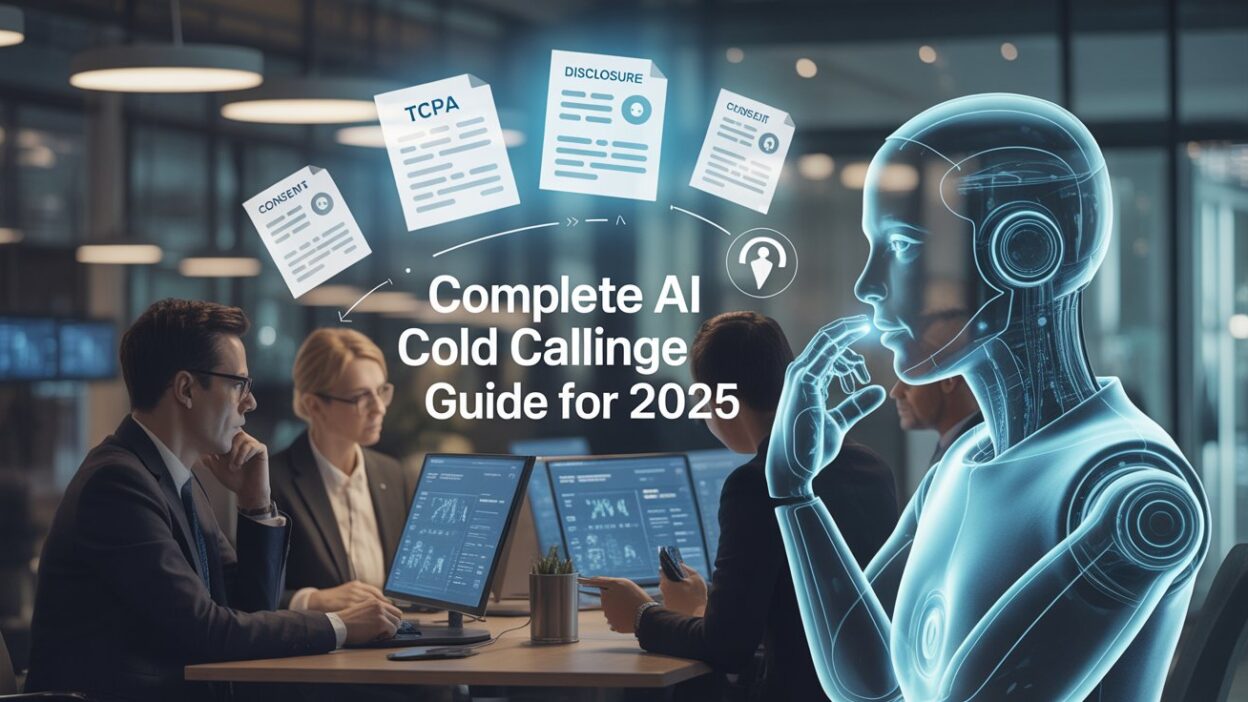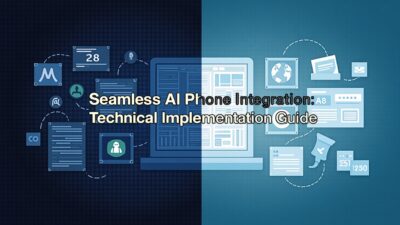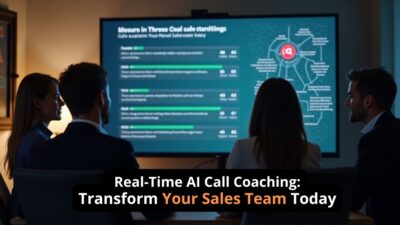The use of artificial intelligence in sales and marketing has changed rapidly. AI-powered cold calling systems are now more advanced and widely used. In 2025, businesses using AI for outbound calling face many new rules and challenges. These include complex regulations, ethical concerns, and compliance issues that didn’t exist a few years ago. Understanding AI cold calling compliance in 2025 is no longer optional. It is essential for any organization that wants to use AI effectively while avoiding legal and financial risks.
Table of Contents
Laws around AI cold calling have become stricter. Lawmakers and consumer protection agencies are responding to concerns. Such as privacy, consent, and the risk of AI being used to deceive people.
This guide explains the key rules for AI cold calling in 2025. It gives businesses the knowledge and tools they need to use AI calling systems that are both effective and legal.
The Evolving Regulatory Landscape for AI Cold Calling
The regulatory framework governing AI cold calling has undergone significant transformation as artificial intelligence capabilities have advanced. Traditional telemarketing laws were designed for human-to-human interactions. It has required substantial updates to address the unique challenges. Also, opportunities presented by AI-powered calling systems.
In 2025, AI cold calling must follow several layers of rules. These include federal telemarketing laws, state AI disclosure rules, global data protection laws, and new AI ethics standards. The FTC has released new guidelines for using AI in marketing. The FCC has also updated its rules to include AI-generated calls under the TCPA.
State-level regulations have also proliferated, with many jurisdictions implementing their own AI disclosure requirements and consent standards. California requires AI transparency. New York has rules for automated decision-making. Texas sets rules for AI caller ID. Together, these laws make AI cold calling compliance in 2025 more complex for businesses.
International considerations have become equally important as AI calling systems often operate across borders. The EU’s AI Act and Canada’s Digital Charter create extra rules for AI cold calling. Other countries have similar laws. Businesses working internationally must follow these rules when calling prospects in different countries.
Core Compliance Requirements for AI Cold Calling in 2025
Mandatory AI Disclosure and Transparency Standards
A key rule for AI cold calling in 2025 is clear disclosure. AI systems must say they are AI within the first 30 seconds of a call. Federal rules require this using specific, clear language.
The disclosure requirements extend beyond simple identification to include information about the AI system’s capabilities and limitations. Callers must know they can ask to speak with a human. They should also be told the call’s purpose and how their data will be used. These disclosures must be delivered in clear, understandable language that accommodates different educational levels and language preferences.
In 2025, businesses must keep detailed records of these disclosures. This includes audio recordings or transcripts to prove they followed transparency rules. Regulatory agencies have increased their auditing activities, making comprehensive documentation essential for avoiding penalties and maintaining good standing.
Consent Management and Opt-Out Mechanisms
Consent management has become significantly more complex under current AI cold calling compliance 2025 requirements. Traditional opt-in mechanisms have been supplemented by AI-specific consent requirements that address the unique nature of artificial intelligence interactions. Businesses must get clear consent specifically for AI calls. They must also explain how AI will use and handle personal data.
The opt-out mechanisms required for AI cold calling systems must be more robust than traditional telemarketing opt-outs. AI systems must recognize and act on opt-out requests right away. They must do this no matter how the request is said or when it happens in the call. The systems must also be capable of processing complex opt-out scenarios, such as partial consent withdrawal or preference modifications.
Real-time consent verification has become a critical component of AI cold calling compliance in 2025. AI systems must check caller consent in real-time. They verify Do Not Call lists, internal blocks, and consent databases before making calls. This verification process must be documented and auditable to demonstrate compliance during regulatory reviews.
Technical Implementation Requirements for Compliance
AI System Capabilities and Limitations Documentation
AI cold calling compliance 2025 requires comprehensive documentation of AI system capabilities and limitations. Businesses must keep clear technical documents about their AI systems. These should explain what the AI can do, its accuracy, how it handles errors, and when to escalate issues.
The documentation must include information about training data sources, algorithmic decision-making processes, and bias mitigation strategies. Regulators need proof that AI systems were tested for bias. They also require safeguards to prevent unfair treatment of protected groups.
Quality assurance processes must be documented and regularly updated to reflect changes in AI system performance and capabilities. This includes ongoing monitoring of call quality, compliance with disclosure requirements, and effectiveness of consent management systems.
Data Protection and Privacy Safeguards
Data protection requirements under AI cold calling compliance 2025 extend far beyond traditional telemarketing data handling rules. AI systems handle much more personal data than human callers. This includes voice patterns, speech traits, and behavior data. They use this to build detailed customer profiles.
Businesses should only collect data needed for the call. They must keep it only as long as necessary. Strong encryption and security are required to protect AI training data and customer records from misuse.
Cross-border data transfer restrictions have become particularly important as AI calling systems often process data in multiple jurisdictions. Organizations must follow data localization rules. They should protect data sent across borders with contracts and strong security measures.
Industry-Specific Compliance Considerations
Financial Services and AI Cold Calling Regulations
The financial services industry faces particularly stringent AI cold calling compliance 2025 requirements due to existing regulatory frameworks and the sensitive nature of financial information. Banks, insurance companies, and investment firms must comply with sector-specific regulations in addition to general AI calling requirements.
Financial institutions must ensure that AI calling systems comply with fair lending laws, including provisions that prevent discriminatory practices in credit-related communications. AI systems must be programmed to recognize and appropriately handle calls that might trigger regulatory disclosure requirements, such as debt collection notifications or insurance claim discussions.
Consumer protection agencies have issued specific guidance for financial services AI calling, requiring enhanced documentation of algorithmic decision-making processes and regular auditing of AI system outcomes for potential discriminatory impacts. These requirements are enforced through regular examinations and can result in significant penalties for non-compliance.
Healthcare and Medical AI Calling Compliance
Healthcare organizations implementing AI cold calling systems must navigate complex privacy regulations, including HIPAA requirements and state-specific medical privacy laws. AI cold calling compliance 2025 in healthcare requires specialized consent mechanisms and enhanced data protection measures that account for the sensitive nature of medical information.
AI systems used for healthcare-related calling must be designed to recognize and appropriately handle protected health information, ensuring that confidential medical data is not inadvertently disclosed or improperly processed. This includes implementing advanced access controls and audit logging capabilities that track all interactions with patient data.
Medical AI calling systems must also comply with professional licensing requirements and medical ethics standards, ensuring that AI-generated communications do not provide medical advice or make health-related claims that could be considered the practice of medicine without proper licensing.
Technology and Software Sales Compliance
Technology companies using AI cold calling systems face unique compliance challenges related to data security, international regulations, and technical accuracy requirements. AI cold calling compliance 2025 for technology sales requires careful attention to cross-border data transfer rules and international privacy regulations.
Software companies must ensure that their AI calling systems can accurately represent complex technical products and services without making misleading claims about capabilities or performance. This requires sophisticated AI training processes and ongoing monitoring to ensure technical accuracy and compliance with truth-in-advertising requirements.
Monitoring and Auditing Requirements for AI Cold Calling Compliance 2025
Real-Time Compliance Monitoring Systems
Modern AI cold calling compliance 2025 requirements mandate real-time monitoring systems that can detect and address compliance violations as they occur. These systems must be capable of monitoring multiple compliance factors simultaneously, including disclosure delivery, consent verification, and appropriate response to opt-out requests.
The monitoring systems must generate detailed audit trails that document all compliance-related activities, including system decisions, human interventions, and corrective actions taken. These audit trails must be maintained for specified retention periods and made available to regulatory agencies upon request.
Advanced analytics capabilities are required to identify patterns that might indicate systemic compliance issues, such as unusually high complaint rates, frequent disclosure failures, or inadequate response to consumer requests. These analytics must trigger automatic corrective actions and human review processes when potential violations are detected.
Regular Compliance Auditing and Reporting
AI cold calling compliance 2025 requires regular internal auditing processes that assess system performance against regulatory requirements and industry best practices. These audits must be conducted by qualified personnel with expertise in both AI technology and regulatory compliance requirements.
Audit reports must document system performance metrics, compliance violation rates, corrective actions taken, and ongoing improvement initiatives. The reports must be maintained for regulatory review and used to demonstrate good faith compliance efforts during enforcement proceedings.
External compliance auditing has become increasingly important as regulatory agencies require independent verification of AI system compliance. Organizations must engage qualified third-party auditors who can assess technical compliance, review documentation, and provide objective evaluations of AI cold calling compliance 2025 programs.
Risk Management and Violation Response Strategies
Proactive Risk Assessment and Mitigation
Effective AI cold calling compliance 2025 programs require comprehensive risk assessment processes that identify potential compliance vulnerabilities before they result in violations. These assessments must consider both technical risks related to AI system performance and operational risks related to human oversight and intervention capabilities.
Risk mitigation strategies must address multiple scenarios, including AI system failures, unexpected regulatory changes, and evolving consumer expectations. Organizations must develop and regularly test contingency plans to ensure they can maintain compliance even when primary systems experience disruptions.
Insurance and liability considerations have become increasingly important as AI cold calling systems can generate significant financial exposure through compliance violations. Organizations must evaluate their insurance coverage and consider specialized AI liability policies that address the unique risks associated with artificial intelligence systems.
Violation Response and Remediation Procedures
When compliance violations occur, AI cold calling compliance 2025 requires immediate response procedures that limit damage and demonstrate good faith efforts to address problems. These procedures must include automatic system shutdowns for serious violations, immediate consumer notification for privacy breaches, and comprehensive remediation plans for ongoing issues.
Documentation of violation response efforts is crucial for regulatory proceedings and can significantly impact penalty assessments. Organizations must maintain detailed records of detection, response, and remediation activities, including timelines, responsible parties, and corrective measures implemented.
Legal counsel involvement is essential for managing serious compliance violations, as regulatory enforcement actions can result in significant financial penalties and operational restrictions. Early legal intervention can help organizations navigate complex regulatory requirements and minimize potential consequences.
Future Trends and Emerging Compliance Requirements
Anticipated Regulatory Developments
The regulatory landscape for AI cold calling compliance 2025 continues to evolve as lawmakers and regulators respond to advancing AI capabilities and changing consumer expectations. Proposed federal AI regulation could establish comprehensive national standards that supersede current state-by-state approaches, creating more consistent compliance requirements across jurisdictions.
International harmonization efforts are underway to create compatible AI regulation frameworks that facilitate cross-border business operations while maintaining consumer protection standards. These efforts could significantly impact compliance requirements for organizations operating in multiple countries.
Consumer advocacy groups continue to push for stronger AI transparency requirements and enhanced consent mechanisms, suggesting that future regulations may require even more detailed disclosures and more robust opt-out procedures than current standards.
Technology Evolution and Compliance Adaptation
Advancing AI capabilities will require ongoing adaptation of compliance programs to address new technological possibilities and risks. More sophisticated AI systems may enable better compliance monitoring and automated violation detection, but they also create new categories of potential violations and ethical concerns.
Integration with emerging technologies such as blockchain for consent management and advanced encryption for data protection may become standard compliance requirements as these technologies mature and become more widely adopted.
Real-time regulatory compliance APIs may emerge to provide automated compliance checking and verification services, enabling AI calling systems to verify compliance status in real-time and automatically adjust behavior based on current regulatory requirements.
Building a Comprehensive AI Cold Calling Compliance Program
Organizational Structure and Governance
Successful AI cold calling compliance 2025 programs require dedicated organizational structures with clear roles and responsibilities for compliance oversight. This typically includes specialized compliance officers with AI expertise. It involves legal counsel familiar with emerging AI regulations, and technical staff capable of implementing and monitoring compliance systems.
Cross-functional collaboration is essential for maintaining compliance across all aspects of AI calling operations.Marketing, sales, legal, technology, and customer service teams must collaborate to understand and consistently implement compliance requirements across the organization.
Organizations must regularly train and educate all staff members to keep them current on evolving compliance requirements and best practices. These programs must address both general compliance principles and specific technical requirements related to AI system operation and monitoring.
Continuous Improvement and Adaptation
AI cold calling compliance 2025 requires an ongoing commitment to continuous improvement as regulations evolve and AI technologies advance. Organizations must establish regular review processes that assess compliance program effectiveness and identify opportunities for enhancement.
Industry participation and collaboration can provide valuable insights into emerging best practices and regulatory trends. Organizations should actively participate in industry associations, regulatory comment processes, and professional development opportunities related to AI compliance.
Technology investment in compliance infrastructure must be ongoing to maintain effectiveness as AI systems become more sophisticated and regulatory requirements become more complex. This includes regular system updates, enhanced monitoring capabilities, and advanced analytics tools for compliance assessment.
Also Read: Upgrade Support With AI Voice Answering Service
Conclusion

AI cold calling compliance 2025 represents one of the most complex and rapidly evolving areas of business regulation. Organizations that successfully navigate this landscape will gain significant competitive advantages through the effective use of AI technology while maintaining consumer trust and regulatory compliance.
The key to success lies in understanding that compliance is not a one-time implementation but an ongoing process that requires continuous attention, regular updates, and proactive adaptation to changing requirements. Organizations must invest in comprehensive compliance programs that address both current requirements and anticipated future developments.
As AI technology advances and regulatory frameworks evolve, businesses that build robust AI cold calling compliance programs in 2025 will best position themselves to seize emerging opportunities and avoid the significant risks of non-compliance. The investment in comprehensive compliance infrastructure and ongoing program management will pay dividends through reduced regulatory risk, enhanced consumer trust, and sustainable competitive advantage in the AI-powered marketplace.
For organizations ready to embrace AI cold calling technology, understanding and implementing comprehensive compliance programs is not just about avoiding penalties, it’s about building the foundation for long-term success in an AI-driven business environment where compliance excellence becomes a key differentiator in the marketplace.






[…] AI automated calling systems handle thousands of simultaneous conversations. Processing power exceeds human capacity limitations. Response times remain consistent regardless of call volume. Quality standards maintain excellence across all interactions. […]